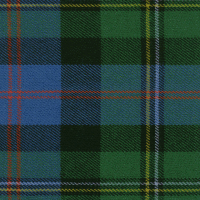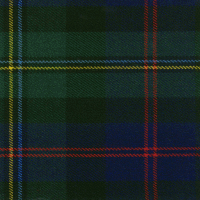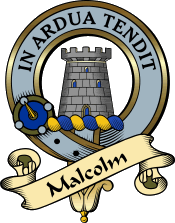In ardua tendit, He has attempted difficult things.
Quarterly, 1st & 4th, Argent, on a saltire Azure between four stags' heads erased Gules, five mullets Or (Malcolm of Poltalloch); 2nd, Or, two chevronels Gules between two buckles fessways in chief and a bugle horn in base Azure, stringed Gules (Orme); 3rd, Argent, a fess dancetty Sable between three Cornish choughs Proper (Thomas).
A tower Argent, window and port Azure.
(on a compartment embellished with rowan plants with berries Proper) On either side, a stag at gaze Proper, collared and chain reflexed over the back Or.
Rowan.
The Maccallums derive their name from 'Mac Ghille Chaluim', 'son of the disciple of
Columba'. They settled in Lorn, probably towards the end of the thirteenth century.
'Maol', or 'shavenhead', became synonymous in Gaelic for 'monk', and thus 'Maol
Chaluim' can also be translated as 'monk' or 'disciple of Columba'. The historian
Dr. Ian Grimble challenges the thesis that Maccallum and Malcolm are simply
interchangeable versions of the same name, asserting in his work, Scottish Clans and
Tartans, that the name Colm was common throughout all the areas of Celtic
settlement. Malcolm appears as a distinct surname in Dunbartonshire and
Stirlingshire as early as the fourteenth century, and no less than four Scottish
Kings were so named.
Ronald Maccallum of Cordarron was appointed constable of Craignish Castle in 1414.
Donald McGillespie Vich O'Challum, received a charter of the lands of Poltalloch in
the parish of Kilmartin in Argyll from Duncan Campbell of Duntrune in May 1562. The
Reverend Archibald Maccallum, translator of parts of the bible into Gaelic,
succeeded his cousin to become the fourth Laird of Poltalloch in 1642. His son,
Zachary, the fifth of Poltalloch, was a noted swordsman who had been educated at St.
Andrews University. Zachary also succeeded to the estates of Cordarron, which were
left to him by a kinsman. Neil Maccallum, son of Zachary's younger brother, Duncan,
served in the French navy, and was reputed to have been the natural father of the
Marquis de Montcalm, who was later to defend Quebec against what may well have been
his own kin. The Highland regiments scaled the Heights of Abraham, defeated the
Montcalm forces and ended French rule in Canada.
John Malcolm of Balbedie, Lochore and Innerneil, chamberlain of Fife in the reign of
Charles I, had four sons: Sir John was created a Baronet of Nova Scotia in 1665;
Alexander became the judge, Lord Lochore; James fought with Viscount Dundee at
Killiecrankie in 1689, and Michael. This distinguished family, today represented by
the eleventh Baronet, bears a version of the chiefly arms of MacCallum, suitably
differenced as determinate cadets, which may provide some evidence of a transitional
link between the two names. However, although heraldic authorities often assert that
armorial bearings assist in authenticating genealogies, this evidence is by no means
conclusive. It is, however, without doubt that it was not until the late eighteenth
century that Dugald Maccallum, ninth of Poltalloch, changed his surname to Malcolm.
According to the late Sir Iain Moncreiffe, this was for aesthetic reasons.
George Malcolm of Burnfoot near Langholm in Dumfriesshire married Margaret, sister
of Admiral Sir Thomas Pasley of Craig, Baronet, in 1761. They were blessed with a
large family including three sons, all of whom were to become Knights of the Order
of the Bath, two as generals and one as an admiral. General Sir John served
extensively in India, and in 1800 he become the first British representative at the
court of the Shah of Persia since the reign of Charles II. He wrote several works on
India, and in 1815 published a history of Persia still regarded by historians as
being of great merit. His brother, Admiral Sir Pultney Malcolm, is perhaps best
remembered as naval commander at St. Helena when the Emperor Napoleon was imprisoned
there after his defeat at Waterloo in 1815. The admiral seems to have had some
sympathy for the fallen emperor's plight. When asked by Napoleon if it was his
government's intention to keep him on the island till his death, Malcolm replied, 'I
do fear so'.
John Winfield Malcolm, who succeeded to the chiefship in 1893, had a distingushed Parliamentary career, representing first Boston in Lincolnshire in England, and then Argyll, from 1886 to 1892. In June 1896 he was raised to the peerage of Baron Malcolm of Poltalloch, but the title became extinct when he died without issue. He was succeeded by his brother, Edward, who was an engineer and much involved in local government. He had two sons, Major General Sir Neil Malcolm, who served in India and Africa, and throughout the First World War, and Sir Iain, who succeeeded to the chiefship. Sir Iain followed his uncle, Lord Malcolm, into politics, and was a Member of Parliament until 1919, when he was appointed one of the government's directors on the board of the Suez Canal Company. He was made Knight of the Order of St. Micheal and St. George and a member of the French Legion of Honour, and the Khedive of Egypt invested him with the Grand Cordon of the Order of the Nile. In 1902 he married Jeanne Langtry, daughter of the famous Edwardian actress and friend of Edward VII, Emilie (Lillie) Langtry. It was widely believed that Jeanne was, in fact, the daughter of Prince Louis of Battenberg, a name now famous in its anglicised form of Mountbatten.
The chief's seat is still at Duntrune Castle, where the family have lived for centuries.
Name Variations: Callam, Callum, MacAllum, MacCallum, Malcolm, Malcolmson.
References:One or more of the following publications has been referenced for this article.The General Armory; Sir Bernard Burke - 1842.
A Handbook of Mottoes; C.N. Elvin - 1860.
Scottish Clans and Tartans; Neil Grant - 2000.
Scottish Clan and Family Encyclopedia; George Way of Plean and Romilly Squire - 1994.
Scottish Clans and Tartans; Ian Grimble - 1973.
World Tartans; Iain Zaczek - 2001.
Clans and Families of Scotland; Alexander Fulton - 1991.
Wikipedia: http://en.wikipedia.org/wiki/Clan_Malcolm

|

Ancient | 
Modern |




Sign-up for a Founders account and receive personalized
family heraldry service and much more!

Want to know more?
Click the Heart!



